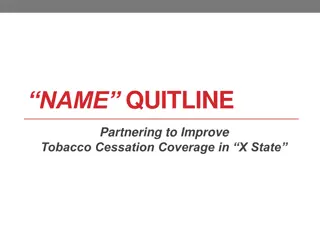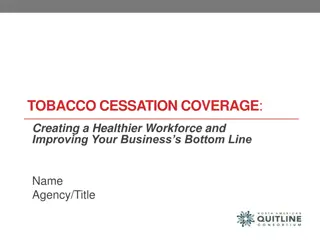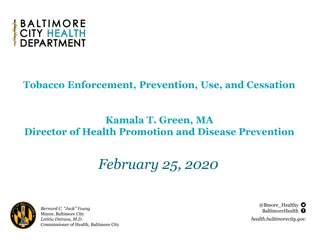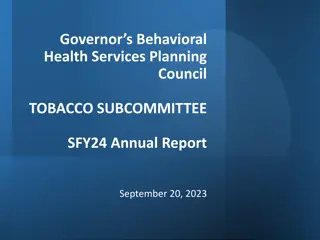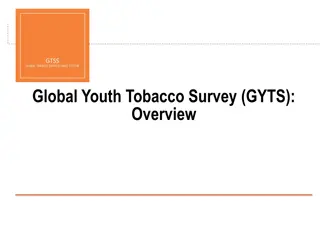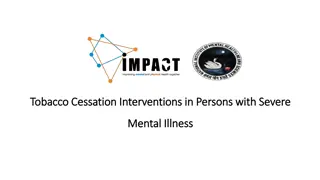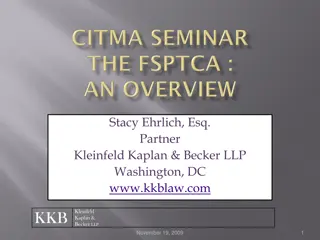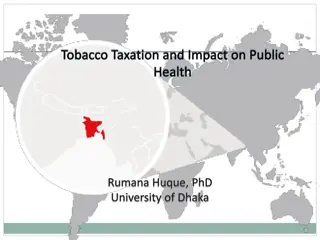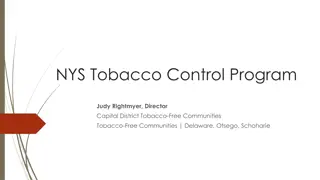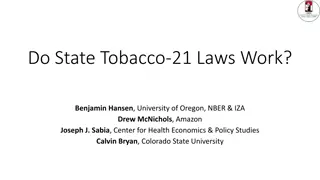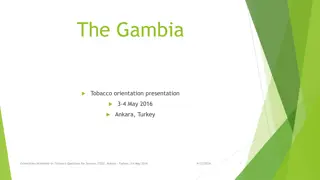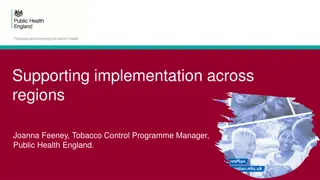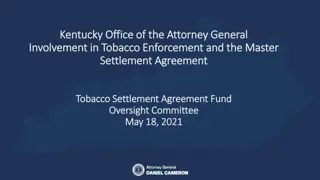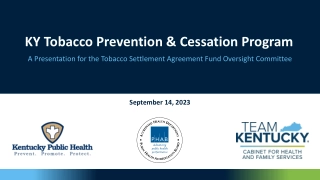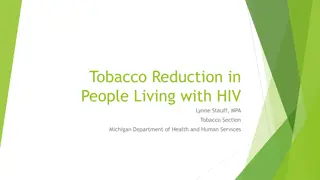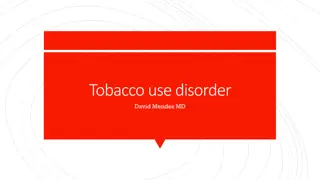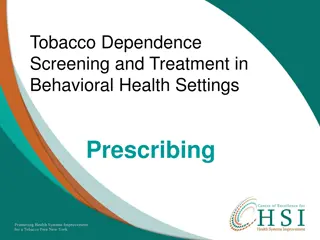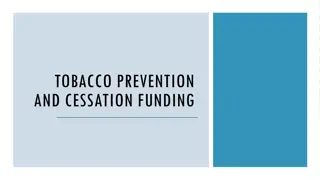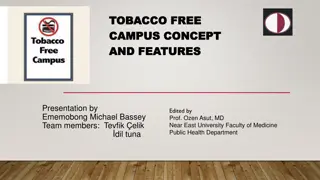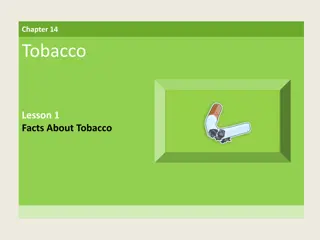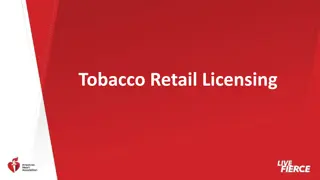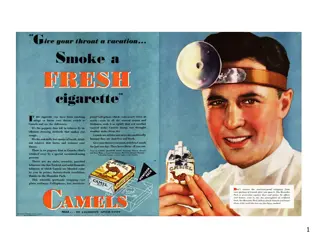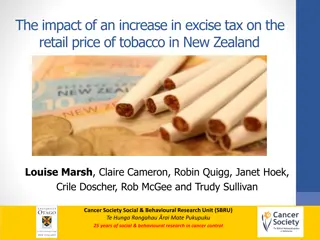Enhancing Tobacco Cessation Efforts in North Carolina
Partnering with QuitlineNC is key to improving tobacco cessation in North Carolina. Research shows that a combination of evidence-based coaching and FDA-approved medications is most effective. Cessation benefits should encompass various treatments while avoiding common barriers. Success rates can be boosted through clinic and community efforts, along with federal-level initiatives like the Affordable Care Act. Understanding the key components and strategies can lead to better outcomes in tobacco cessation programs.
Download Presentation

Please find below an Image/Link to download the presentation.
The content on the website is provided AS IS for your information and personal use only. It may not be sold, licensed, or shared on other websites without obtaining consent from the author. Download presentation by click this link. If you encounter any issues during the download, it is possible that the publisher has removed the file from their server.
E N D
Presentation Transcript
SETTING OUR COMPASS QuitlineNC: Partnering to Improve Tobacco Cessation in North Carolina
We Know What Works Research indicates the most effective tobacco treatment is a combination of: evidence-based coaching and FDA approved medications. QuitlineNC is high quality and effective
Cessation Benefits Cessation Benefits Should Include ALL of These Treatments: Barriers to Avoid: MEDICATIONS COUNSELING Co-pays Prior authorization Duration limits Annual limits on quit attempts Dollar limits Requirements to try one medication before another Requirements to pair medications with counseling Nicotine Gum Nicotine Patch Nicotine Lozenge Nicotine Nasal Spray Nicotine Inhaler Bupropion Varenicline Individual Group Phone Helps meet ACA criteria
What increases success rates? Clinic: Clinicians Using 5 A s Ask - Identify and document tobacco use status for every patient at every visit. (You may wish to develop your own vital signs sticker, based on the sample below). Advise - In a clear, strong, and personalized manner, urge every tobacco user to quit. Assess - Is the tobacco user willing to make a quit attempt at this time? Assist - For the patient willing to make a quit attempt, use counseling and pharmacotherapy to help him or her quit. (See Counseling Patients To Quit and pharmacotherapy information in this packet). Arrange - Schedule follow-up contact, in person or by telephone, preferably within the first week after the quit date. Counseling plus FDA Approved tobacco treatment Using combination therapy tailored to the need (e.g. Patch + buproprion; patch + gum) Using the full course of medications Community: Smokefree workplaces and public places/social norm changes Price increases (at least 10% of the price of a pack of cigarettes) Mass media campaigns (especially when combined with local programs like QuitlineNC)
Federal-Level Cessation Puzzle Pieces Affordable Care Act: private insurers Joint Commission Tobacco Treatment Performance Measure Set Medicaid Quitline Guideline CDC s Resources: Tips from Former Smokers Campaign and Quitline Capacity funding Federal Employee Health Benefit Meaningful Use Affordable Care Act: public insurers
Patient Protection and Affordable Care Act (ACA) Signed into law on March 23, 2010 Multiple provisions that increase access to clinical preventive services Required private health plans to cover all U.S. Preventive Service Task Force (USPSTF) A and B Recommendations Helps meet ACA criteria
Patient Protection and Affordable Care Act Eliminate cost sharing requirements for preventive services Applies to insured group and individual plans and self insured plans, but does not apply to grandfathered plans Generally required of all new plans beginning on or after September 23, 2010 Helps meet ACA criteria
Tobacco A Recommendation The USPSTF recommends that clinicians ask all adults about tobacco use and provide tobacco cessation interventions for those who use tobacco products. Tobacco use counseling: pregnant women The USPSTF recommends that clinicians ask all pregnant women about tobacco use and provide augmented, pregnancy-tailored counseling to those who smoke.
Tobacco Cessation benefits under the Affordable Care Act Updated May 2, 2014 The Obama Administration recently issued guidance recommending comprehensive quit smoking benefits available through the Affordable Care Act (ACA). Specifically, this includes coverage* of: All medications approved by the FDA as safe and effective for smoking cessation; Individual, group and phone cessation counseling; These quit smoking benefits should be offered at least twice a year to smokers, recognizing not everyone quits on their first try; Plans should not require prior authorization for these benefits; and These benefits are to be provided at no cost to the patient so no co-pays, coinsurance or deductibles should be charged. * Applies to private non-grandfathered; does not apply to traditional Medicaid or Medicare; they are still allowed to charge a co-pay.
The Joint Commission An independent, not-for-profit organization, The Joint Commission accredits and certifies more than 20,500 health care organizations and programs in the United States. Joint Commission accreditation and certification is recognized nationwide as a symbol of quality that reflects an organization s commitment to meeting certain performance standards. The Joint Commission Performance measure set includes: 1. Screening for tobacco use from all patients entering in the hospital. 2. Treating or offering tobacco treatment to all tobacco users in the hospital. 3. Treating or offering tobacco treatment to all tobacco users upon discharge of the hospital. 4. Following up within 30 days to determine tobacco use status of tobacco users after discharge from hospital.
Meaningful Use Meaningful Use* is an incentive plan that eligible health care professionals and hospitals can qualify for through Medicare and/or Medicaid when they adopt certified Electronic Health Record (EHR) technology and use it to achieve specified objectives. Meaningful use core objective for tobacco use: a. Percentage of patients aged 18 years and older who have been seen for at least 2 office visits who were queried about tobacco use one or more times within 24 months; and b. Percentage of patients aged 18 years and older identified as tobacco users within the past 24 months and have been seen for at least 2 office visits, who received cessation intervention. * The Recovery and Reinvestment Act of 2009 (ARRA) established the Health Information Technology for Economic and Clinical Health (HITECH) Act. Meaningful Use came out of regulations from the HITECH Act.
Center for Medicare and Medicaid Services - CMS Medicaid Quitline Guideline CMS sent a letter out to all state Medicaid directors (June 2011) that: Encourages states to offer evidence-based telephone Quitline services to all Medicaid beneficiaries; and States that tobacco cessation Quitlines are Allowable as Medicaid Administrative Activities; that Medicaid can provide a 50% administrative match for Quitline services through the Federal Financial Participation (FFP) Agreements; and Prohibiting cost sharing for services provided to pregnant women which includes counseling and pharmacotherapy for cessation of tobacco use by pregnant women.
Federal Employee Health Benefit: Special Initiative: Quit Smoking There has never been a better time to quit smoking. All FEHB plans now offer 100% coverage to help you quit once and for all. Beginning in plan year 2011, all FEHB plans must cover: Four tobacco cessation counseling sessions of at least 30 minutes for at least two quit attempts per year. This includes proactive telephone counseling, group counseling and individual counseling. All 7 Food and Drug Administration (FDA) -approved tobacco cessation medications with a doctor's prescription. These benefits must be provided with no copayments or coinsurance and not subject to deductibles, annual or life time dollar limits.
North Carolinas Comprehensive Cessation Puzzle Pieces Blue Cross/ Blue Shield NC largest Payer State Health Plan for Teachers and Employees gets $3.95 ROI for Every $1 invested NC Medicaid Covers CDC Quitline Capacity Grants and Tips from Former Smokers ??? QuitlineNC Gets $1.2m from NCGA Creative Collaborative Solutions Affordable Care Act: Recommendations


